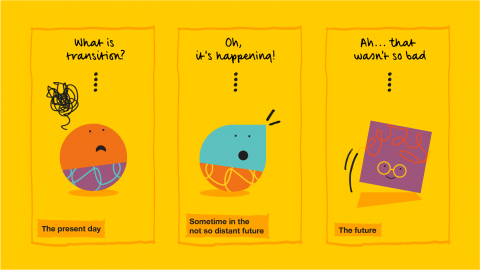What to expect

Will the adult service be different?
In the build-up to your transition, you might notice your paediatric team encouraging you to get more involved in making decisions about your care. That’s to prepare you for moving to adult care, where your new team will want to make decisions with you rather than for you. While you can still have support during your appointments, your opinion will be what counts the most.
“Adult care really isn’t that much different from paeds, apart from having a different team. In fact, it’s sort of better because you can be more independent if you want and your family don’t have to know everything you discuss with the team.” – Izzie
How involved you are in your care might change, but your care itself shouldn’t when you move unless for a medical reason. Your old team should share a detailed, written handover with your new team, and make sure that you continue to receive the appropriate level of care to keep you well.
“Of course, at adults they teach you how to be more independent. But everyone is different and it will take everyone different lengths of time to adapt. I’d encourage people to ask questions. No question is silly and the doctors love to chat about your life as well to get to know you more.” – Lucy
What about the new centre itself? When you first visit, it might feel a bit less ‘homely’. Paediatric CF centres are set up to make sure young children with CF feel comfortable. Most of the time, people visiting adult CF centres are used to meeting their team and having tests or procedures. Because of this, things might look and feel a bit different to your paediatric centre.

What will happen when I move?
“When I was transitioning up to the adult unit, I was handed a little folder which contained an information booklet and a leaflet about the adult centre. I was also allowed a home visit from one of the specialist nurses from the adult unit, who came to introduce herself and the team and answered any questions myself or my parents had.” – Emily
In the same way that you don’t go to sleep one day a child and wake up the next day an adult, transition shouldn’t happen overnight. Your transition will probably start with a conversation between you, your family or carer and your CF team. Here, your CF team should explain what transition is and the plan they have for your transition.
Over the next few months, or even years, you’ll probably start having more and more conversations about your transition. This might include talking about which CF centre you’re going to move to. Eventually you should have a chance to visit your new centre, meet your new team and get to know them.
This is a rough outline of what your transition might look like, but every transition is unique. Your transition will depend on what you’re like as a person, your health and your own personal choices. Different CF centres also have different ways of doing things. Some hold transition clinics, where your paediatric and adult teams both attend, and you all get to know each other. Some will have their own resources to share with you, to help make sure you have all the information you need.
“I had pre-transition clinics which I found beneficial in that I was introduced to some of the primary healthcare professionals who would be playing large roles in my care.” – Hasna
Most importantly, speak to your CF team before you transition, and let them know if you have any questions or worries. They’ll be happy to help, and excited that you want to be involved in this important change.
How long does it take?
“Although it may seem daunting, it should be a smooth process that is spread out over a couple of months, so that it doesn’t just happen all at once.” – Emily
Like everything else, this will depend on you. If you’re moved to adult care because you’re unwell, it might happen very quickly. If you’re worried about moving to adult care, it might happen very slowly. Your CF team should make these decisions with you.
Ask your CF team what plan they have for your transition. This should help to give you an idea of what your transition timeline is, and allow you to work together on a plan that you’re happy with.
“When I got to adults I was basically admitted straight away. I had to be admitted as an inpatient for six weeks. That is really how I got to know the team because I was with them 24/7 for that time. I was thrown right into the deep end.” – Cicely
Tips and ideas
Young people with CF and CF team members share their tips for a smooth transition.
Questions to ask
Some suggested questions to ask your paediatric team and your new adult CF team.
Transition checklist
You can use this checklist to talk with your old and new teams about how your transition is going.
My adult healthcare team
Use this template to fill in the details of your new CF team to help you get to know them better.
